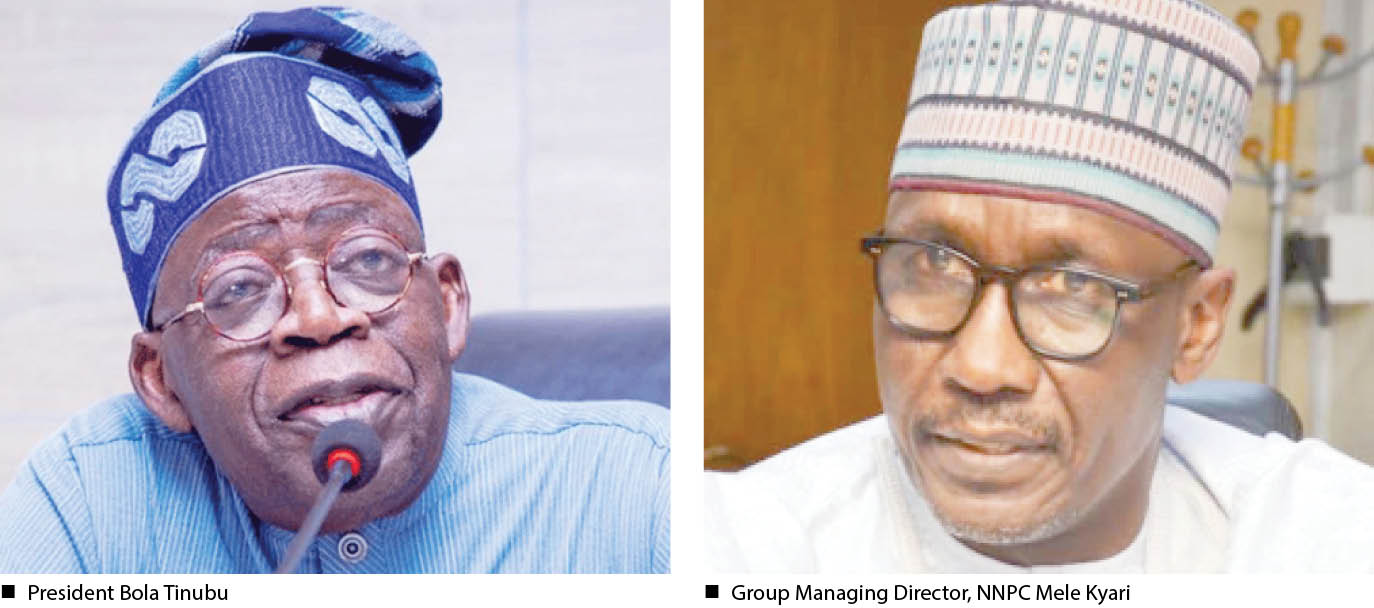We need transparent pricing of petroleum products
Following the announcement last week that the much-awaited petroleum products from the privately owned Dangote Refinery would hit the market, Nigerians had cause to heave a sigh of relief that the country would soon see the end of the perennial crises in the availability of the product at affordable prices. The main cause for relief […]

tinubu and kyari
Following the announcement last week that the much-awaited petroleum products from the privately owned Dangote Refinery would hit the market, Nigerians had cause to heave a sigh of relief that the country would soon see the end of the perennial crises in the availability of the product at affordable prices.
The main cause for relief stems from the fact that the 650,000 barrels per day Dangote Refinery has the capacity to refine crude from local sources, thereby meeting the demands of the Nigerian market. It is also hoped that local sourcing of the commodity will bring to an end the importation of petroleum products, which has been going on for over two decades now. Additionally, the sourcing and refining of crude oil will lessen the pressure on the need for foreign exchange to import the commodity, and thereby stabilise the parity of the naira against foreign currencies.
However, against the background of these expectations, the euphoria of Nigerians was short-lived as, in the coming hours and days, reports flowed thick and fast on the tango between the Nigerian National Petroleum Company Limited (NNPCL) and the Dangote Refinery on the pricing, marketing and distribution of petroleum products from the refinery.
First of all, the NNPCL insisted that it would be the sole off-taker of the products from the refinery. Then it turned around to say that local marketers can also lift the products. Earlier on, before the commencement of production, Dangote Refinery had complained that it was being denied crude from local sources and that in order to meet its production target, it was resorting to importation of crude from foreign sources.
- NIGERIA DAILY: What Comes Next After The Edo Governorship Election?
- Flood: Zulum constitutes panel to disburse fund, lists EFCC, DSS, others as members
Following this complaint, President Bola Ahmed Tinubu ordered that the refinery be supplied crude from local sources to be paid in naira. Subsequently, the Minister of Finance and Coordinating Minister of the Economy, Wale Edun, announced that crude oil supplies to Dangote Refinery would only commence in October. This effectively means that the petroleum products now being refined from the refinery were sourced from abroad and paid for in foreign currency.
The next stage in the feud between the NNPCL and Dangote Refinery is in the pricing of the commodity. Again, NNPCL insisted on setting the price mechanism for the products, and in this regard proceeded to announce the prices per location. The company said it had bought the commodity at N898 per litre from the refinery. Thus, in the latest increases, NNPCL set the price per litre at N950 in Lagos and up to N1,019 further up north of the country.
That Nigerians are exasperated at this whole rigmarole is an understatement. They are especially piqued that instead of getting the product at affordable prices, they are having to endure a runaround on the availability and pricing of a commodity that exists locally in abundance.
In the prevailing situation of uncertainty regarding the NNPCL and the Dangote Refinery, Nigerians are asking: Did the government not say that the oil and gas industry has been deregulated and that product availability and pricing should be determined by market forces? With the passage of the Petroleum Industry Act (PIA), NNPCL having become a commercial entity, should the company be playing the role of a regulator, a monopoly and price controller in the market as in this case?
Nigerians believe the open involvement of the NNPCL in the Dangote Refinery oil pricing and distribution is unethical and a clear negation of both the PIA and the deregulation of the sector as proclaimed by the government. They also believe that it is this interference that is largely responsible for the distortion in the supply and pricing of petroleum products in the country, which has by extension negatively affected the economy as a whole.
Daily Trust believes, like most Nigerians, that the NNPCL should direct its attention to its four refineries that have been inoperative for years now. It is particularly a matter of great concern that the NNPCL has not been able to bring the Port Harcourt refinery, refurbished at great cost, into operation despite promising to do so several times. This is where we expect the NNPCL to direct its efforts and energies.
Nigerians expect to see NNPCL involved in increasing oil production through its refineries, in addition to independent refineries like the Dangote Refinery, so as to ensure the availability and fair pricing of petroleum products for the ultimate benefit of the country’s economy.
Accordingly, we call on President Tinubu, as the substantive Minister of Petroleum, to prevail on the NNPCL to allow the Dangote and other refineries to market their products without hindrance or obstructionist interventions in what is supposed to be a deregulated market.
